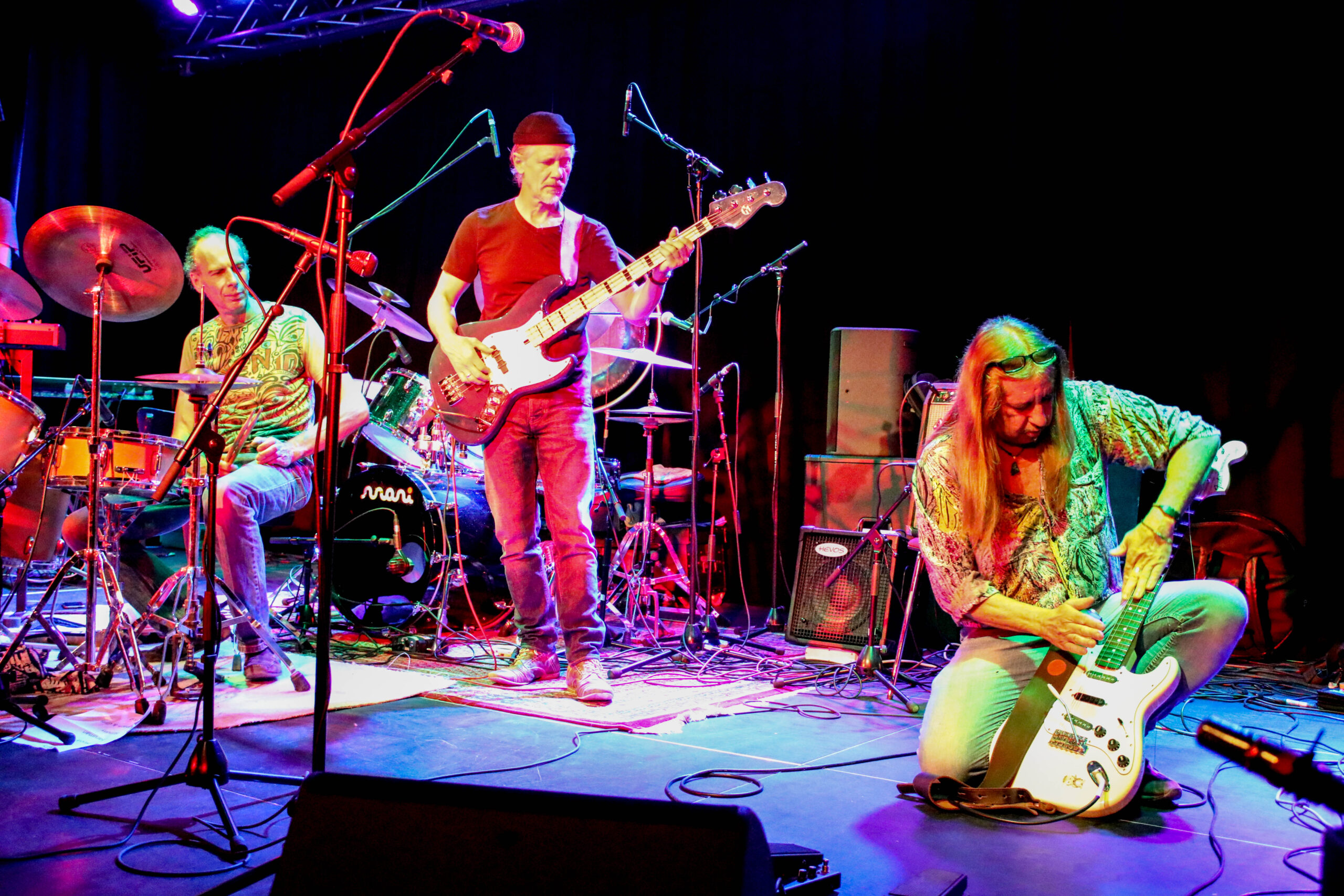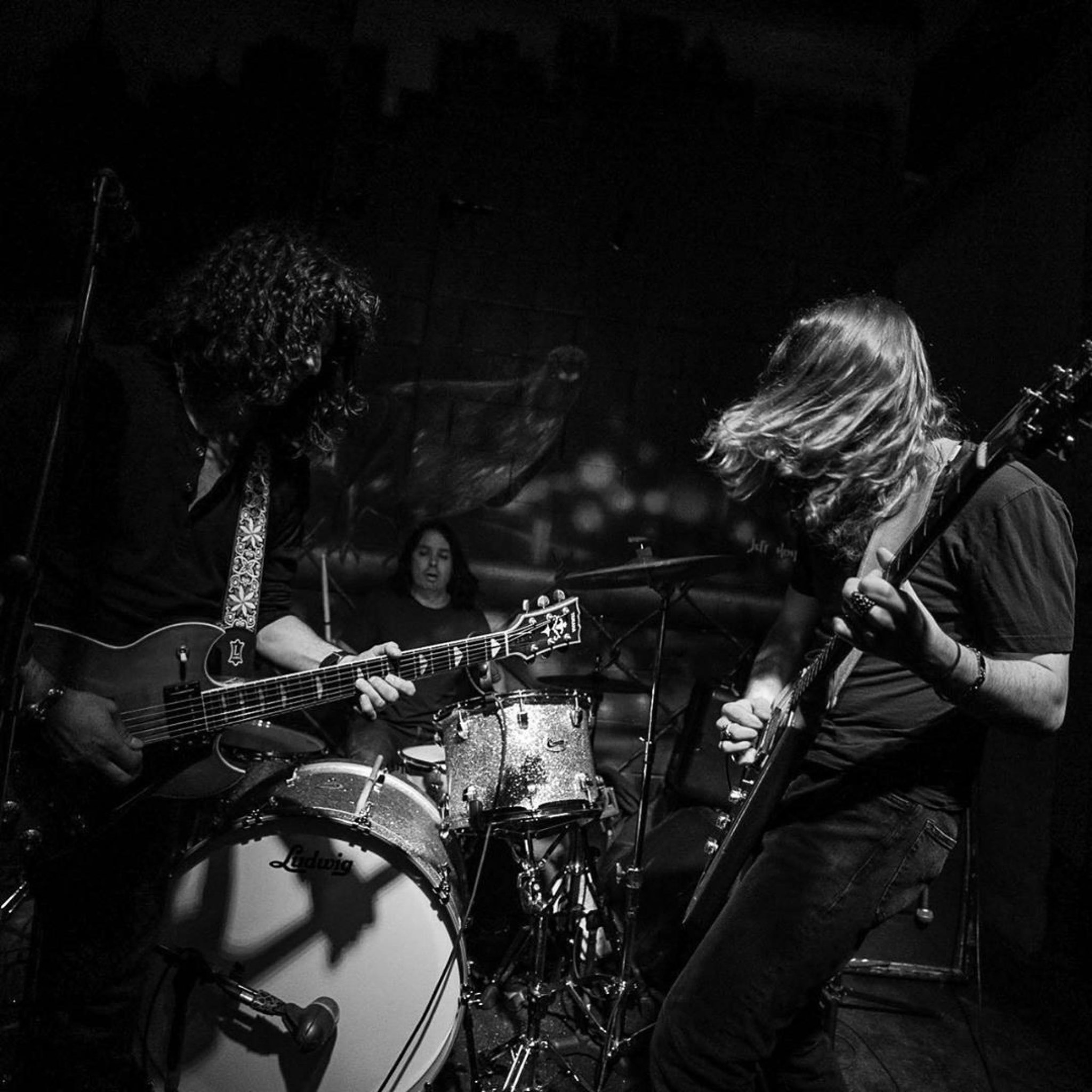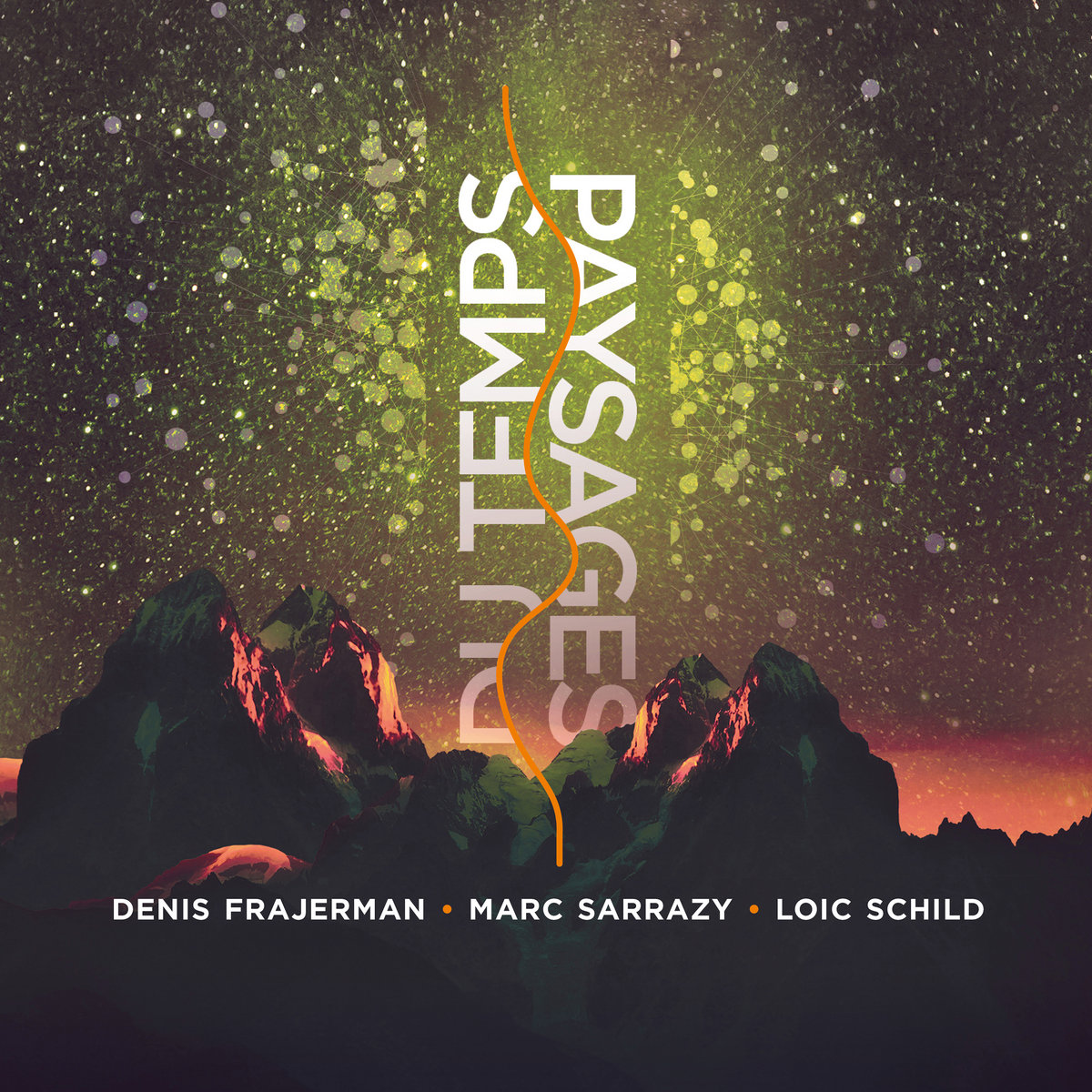Violette Sounds | Interview | Karl Henneberg
Violette Sounds is a project consisting of Karl Henneberg (vocals, drums), Henri Thönnissen (guitar), Moritz Schippers (keyboards), Sascha Mans (bass) travelling between the world; from a wide spectrum of jazz, psychedelic rock to progressive rock.
The group has full dynamic, energetic guitar riffs, accompanied by excellent keystrokes and expressive vocals with sparkling Hammond organ passages. In 2022 Violette Sounds joined the singer and “Tibetan Warrior,” Loten Namling. The band is currently finishing their upcoming album entitled ‘Infinity’.
“The universe is music and sound”
How did you first get interested in music and drums? What are some of the early influences?
Karl Henneberg: I wasn’t born in that typical musical environment where the parents were playing instruments and were listening to a lot of music et cetera. In Belgium we had early musical education with a cheap plastic recorder in school. Belgium is a country which is very friendly for music and arts. Arts do have a good value there and you can find a lot of high music schools to go further. It was a funny experience for me. Imagine, 20 young people screaming in unison into that plastic recorder songs like ‘Jingle Bells’ and ‘Santa Maria’ in unison. What an incredible noise. Anyway the teacher was very kind and we also learned to sing C-major scale to sing with your own voice Do-Re-Mi et cetera. It felt fine. I think everyone who is singing a little bit knows that “sacred” feeling of the voice. Unfortunately this music teaching stopped early anyway.
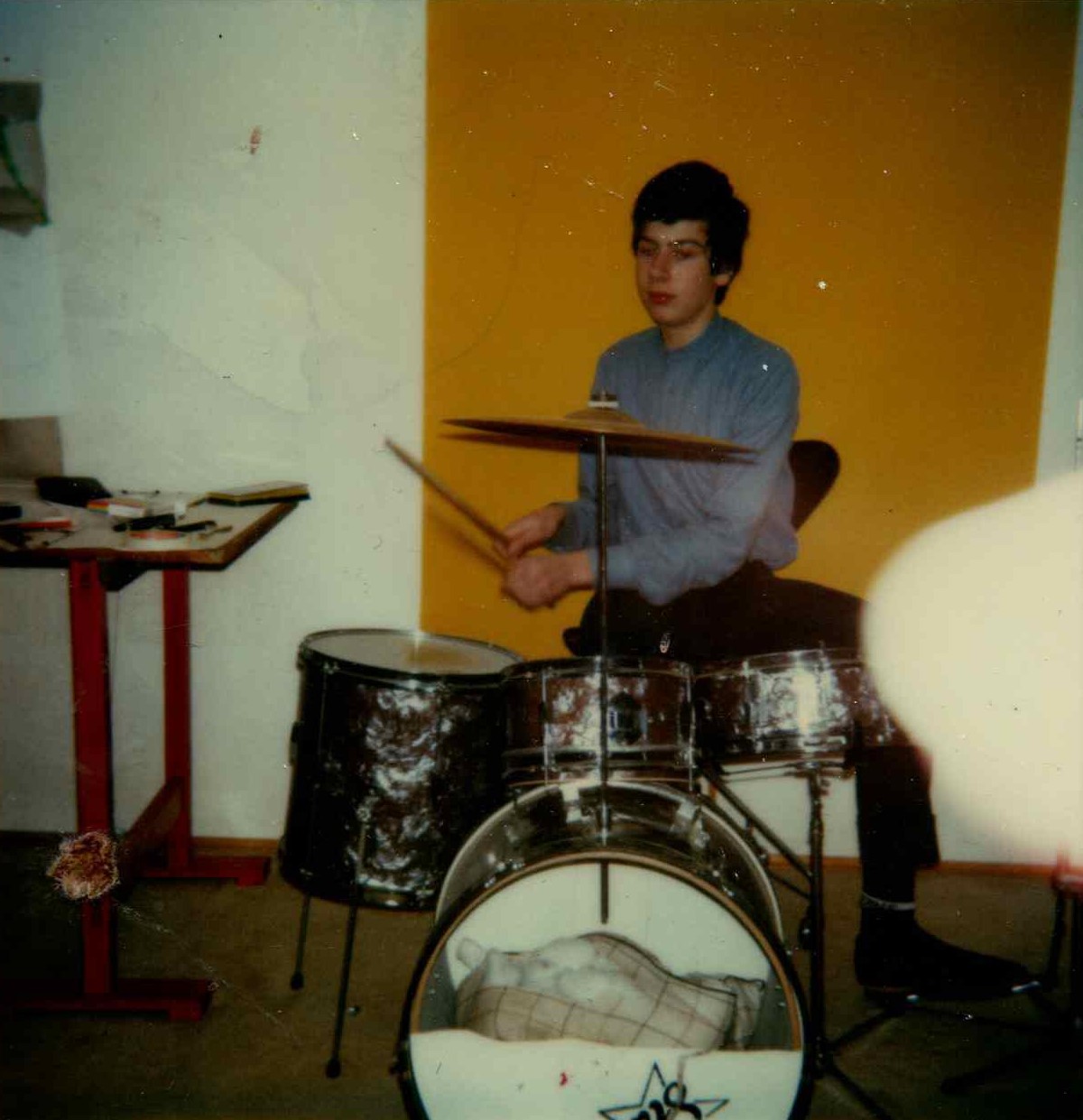
At the age of 10 I got crazy for violin. Two guys, twins, gave a lecture on the history of violin and at the end they played in duo Bach or something. I was so impressed and fascinated and wanted to do that too. So I got support by my mother. She bought a beginner violin and I got some lessons, but then my teacher was the stepfather of my mother and I don’t know, it was kind of cruel I had to take the school bus with that violin case and had to defend this fragile instrument in the bus to keep it around me. For me it was such an expensive instrument and I felt so responsible. Often the instrument made a little voyage through the bus, Jesus Christ! Also, I couldn’t get a good sound out of it, hehe. It seemed normal in the beginning, but anyway I stopped. I felt so guilty because this expensive instrument was bought especially for me, but for my mother it wasn’t a problem.
My first music wasn’t The Beatles or The Stones, I was listening to Johnny Cash’s ‘Ring Of Fire’ and a little bit of Mozart. So I really grew up in the countryside. In the middle of nowhere with cows and grass and few people around me. After school at the age of 13 I met a friend who played guitar and who was addicted to rock music. We had a lot of fun. His father was playing guitar too in a hard rock band and they were listening to all that 70s music. Deep Purple, Genesis, Pink Floyd, but I was mostly focused on Deep Purple. Ok, to make a long story a little bit shorter, they also had a kind of very bad bass drum and snare drum in the house, no cymbals. Anyway, I got really crazy for drumming. It’s such a nice and intense feeling, kind of magic and then the feeling of playing together with other people, the sound, the feeling, the intensity, amazing and intense. It really changed my life. So we wanted to start a rock ‘n’ roll band, but there are not enough instruments around, everything is expensive. Even bad instruments were so expensive at the time, money was a big thing. It’s not that I come from a poor family, but to get money for rock ‘n’ roll amplifiers and instruments wasn’t that evident. Still, I was so crazy to get a real drum set that I annoyed my parents until they bought a really bad and cheap set with horrible cymbals and sounds, but it was like gold for me. I found it in a second hand ad. I remember as I got this set the first day my father was listening to American Air Force Big Band stuff. He never heard me playing before. I started an easy, but very loud rock rhythm and he was totally shocked and asked me if that noise is “playing drums?” Jesus, finally he sat down behind the drums himself and played a little soft ride cymbal swing rhythm tinge ding. Very strange to me at that time. Funny, different opinions between generations. Finally my parents were very patient and we played a lot of that noise with friends in our house, had a lot of fun and tried to make different bands, which wasn’t easy as there weren’t a lot of musicians around us back then. You know you can read all those stories about the Canterbury scene with a lot of creative musicians around et cetera, with me it wasn’t like that. The school system was focused on science and languages. The bars and party scene around me were focused on top 40 and blues rock. The father of my friend played sometimes at motorcycle gang parties. A lot of beer and mud fights at the end. Beside that I got a bad acoustic guitar from my sister and was trying to get some chords out of it. You know, when I’m thinking back now I realize that I was trying to express my emotions in music. I found that emotions are a very big thing in life, not “the mind” in the traditional Indian Vedic Sanskrit. You have a lot more words for emotions and mind, one word for that is “Chitta” or “Citta”. It expresses the soul and the mind in a way. In our tradition we are often focused on the mind and have a separated view of emotions, mind and so on, but you can see it in another way, like that you and your body is a very complex system which is connected to your WHOLE environment. We are individuals on the other hand, we are part of the whole. We are part of the ground, the water, the fire, the wind and finally part of the universe and we do belong to nobody. Our emotions can show us a way to liberate us and become part of the whole again back from that idea of a separated view in life. That’s another story besides we all know that we can find a lot of teachings and literature of this subject in our times.
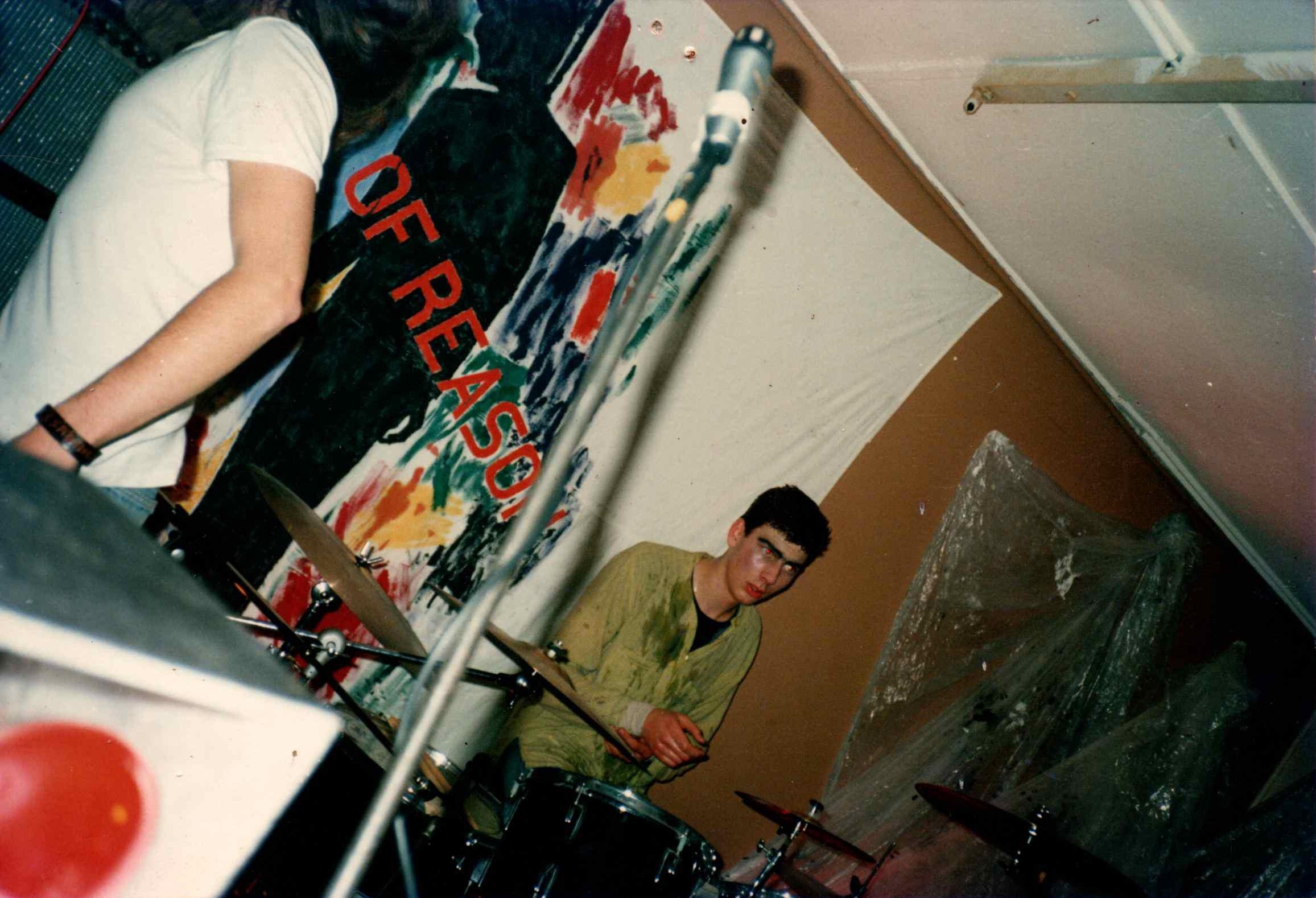
Back to my little story, I think I felt a certain loneliness inside and so I was happy when I could make music with other people and had a kind of desire to develop my own ideas on a very simple musical base. I really liked Ritchie Blackmore’s Rainbow with Cozy Powell. after that I was listening to The Stones et cetera. At the age of 15 I saw a concert with Deep Purple and Meatloaf in Mannheim. Deep Purple was a big thing. Most impressive was Jon Lord with that shaking Hammond sound. At that time I didn’t listen to the more psychedelic bands like Cream or Hendrix. It was impressive but this long and complex soloing and the psychedelic atmosphere didn’t touch me yet. I couldn’t share that feeling. I preferred a little bit more easy structures and melodies et cetera. I think it had to do with my drug-free lifestyle. A lot of my friends were close to drugs, but I was special and refused drugs and alcohol, even when I tried it sometimes, I didn’t feel crazy.
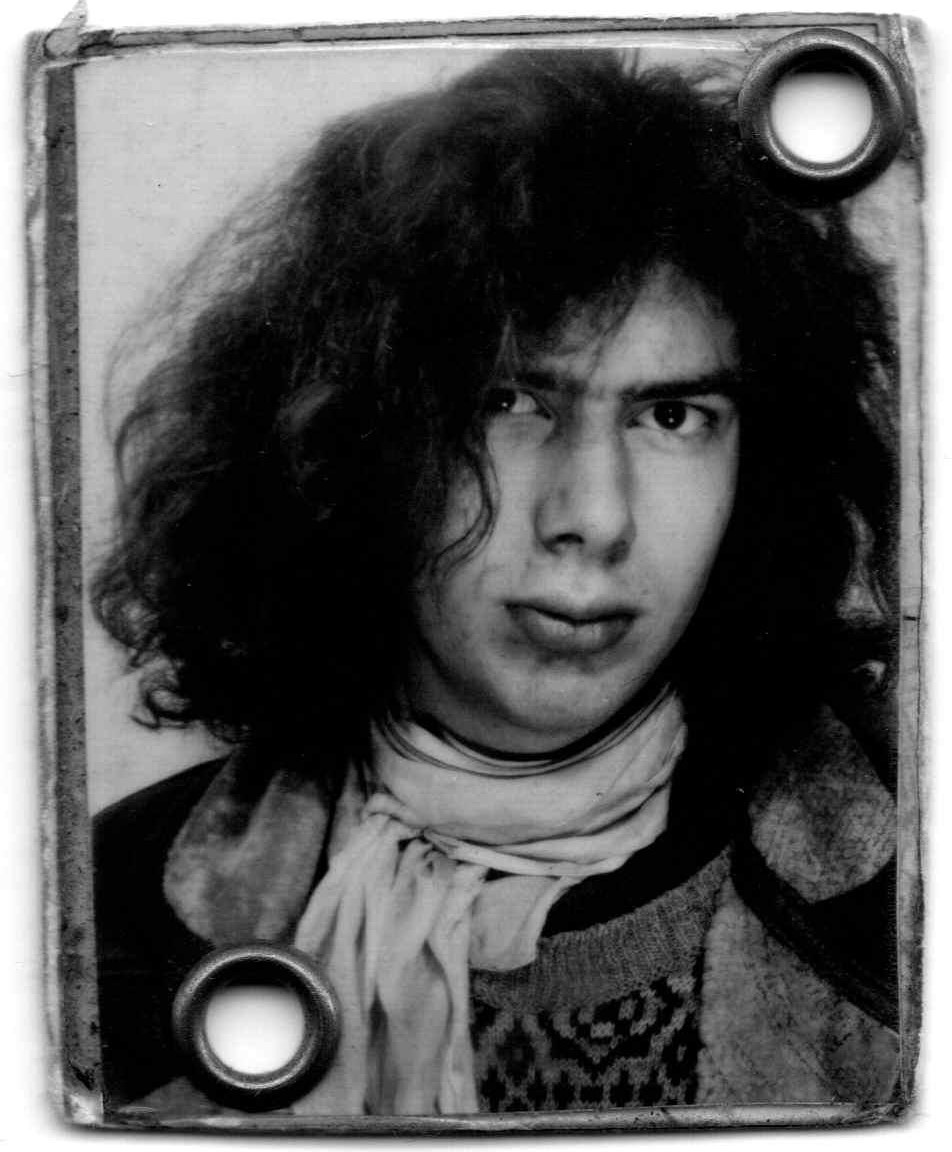
Were you in any bands before forming Violette Sounds?
At the age of 18 we started our first serious band. It was a punk wave. We were called Lack Of Reason. In my school in the countryside I was the first guy with coloured hair and I had a lot of rage inside. I felt so crushed by that school system. I got my notes, but when I’m looking back, I should have left that high school system. I don’t believe anymore in sitting down and just listening to information for years and repeating cruel history lessons of power and violence. I fled into mathematical systems to keep my crazy mind quiet, it was a kind of refuge or meditation by focusing on complex structures, but mathematics is just a logical system inside of fixed parameters that really everyone can follow and blow up. Years after that I read and heard about other education systems like for instance Neill’s Summerhill and Rudolf Steiner’s Anthroposophy. Here you have another approach to education and experience of life. It’s also important to work and to apply your own to the information and not only force it in your mind. So in a way that’s our social disaster. After finishing high school they asked you what you will study and so on, but how can you know what to do and how to live and to have an opinion of life if you are always getting and repeating theoretical information. That’s just my personal opinion. So deep inside I just wanted to get out of these values. So it seems that early punk music was a way to go. The Sex Pistols with the amazing ‘God Save the Queen,’ ‘Anarchy in the UK’ and Iggy Pop! I love him. The music touched me so hard. Iggy and the Stooges. What a sound! What an energy and Iggy jumping all over the place so easily and funny. ‘I Wanna Be Your Dog,’ ‘Dirt,’ ‘Raw Power’. Amazingly, we also played a little bit more lyrical songs, I always liked to play my own songs and to compose easy things. We had some little concerts at that time and after finishing school the only thing I really wanted to do is what a lot of young people are doing now, take or hire a cheap van and travel around the world with no money and try to play concerts around the world. Unfortunately the guitar player couldn’t manage it, because he became a father very early and so on.
Things are going on and our society system asked me to do military service, but guns and violence, no way for me to get peace. I refused military service and had to work in a kind of hospital instead for 20 months. Again a long period. In this time I met a good drummer and teacher and I tried to learn more complex rhythms on drums. After that I got good lessons from jazz drummers and fell in love with that jazz rhythm and drumming. In a way it’s kind of logical to me that in jazz music the drums have a very melodic and free approach to the music. In jazz you can find a lot of space for this instrument to express yourself, ok that also happens in psychedelic rock music and art rock. In jazz you have that African organic feeling on top. I fell in love with John Coltrane and Elvin Jones, and also Ornette Coleman and Charlie Haden and Ed Blackwell with Don Cherry, Miles Davis. I practiced jazz drumming, had some fights with easy solfege and ear training and tried to prepare myself for studies in a jazz conservatory, but they decided that I’m not ready yet so big void again (also Led Zeppelin, Rage Against the Machine, Hendrix entered into my musical life).
By coincidence I found a course for improvised music at the conservatory of Liège with Garett List. I phoned him and asked if he is teaching jazz music. He told me in a very serious voice that he is teaching improvised music and they do jazz too. I asked how to get in that course and he told me that EVERYONE can participate. The course is three years. All people spent three years together, the only condition to get part of the course is to bring an instrument or your voice (any instrument). Later I heard that there was a guy who came to perform with a vacuum cleaner, but to play own “new” individual music. So I went there in summer to the French part of Belgium. I didn’t know anything else about this course and came there with my drums. I entered a room with around 20 people. Garett List is a big American guy, like a rock, and he was so serious! He created an atmosphere that nobody could bring out one note. You know, if you don’t know what happens and you don’t know anybody and the teaching guy is looking like he‘ll be killing you with an interesting atmosphere, you don’t bring out any note. I don’t know how to do it again, but somehow I played something where the other students performed strange noises and crazy stuff on piano, saxes, voices et cetera.
Garett List is a classical trombone player from the US who wanted to explore music and spent a lot of time and energy in NY with free and experimental music. After Juilliard school he met Henri Pousseur and Pierre Boulez and played their music. Also he met John Cage, Karl Berger, Anthony Braxton, Steve Lacy and entered more and more into the free jazz scene. He was the leader of New York’s “Kitchen Center for Video and Music”.
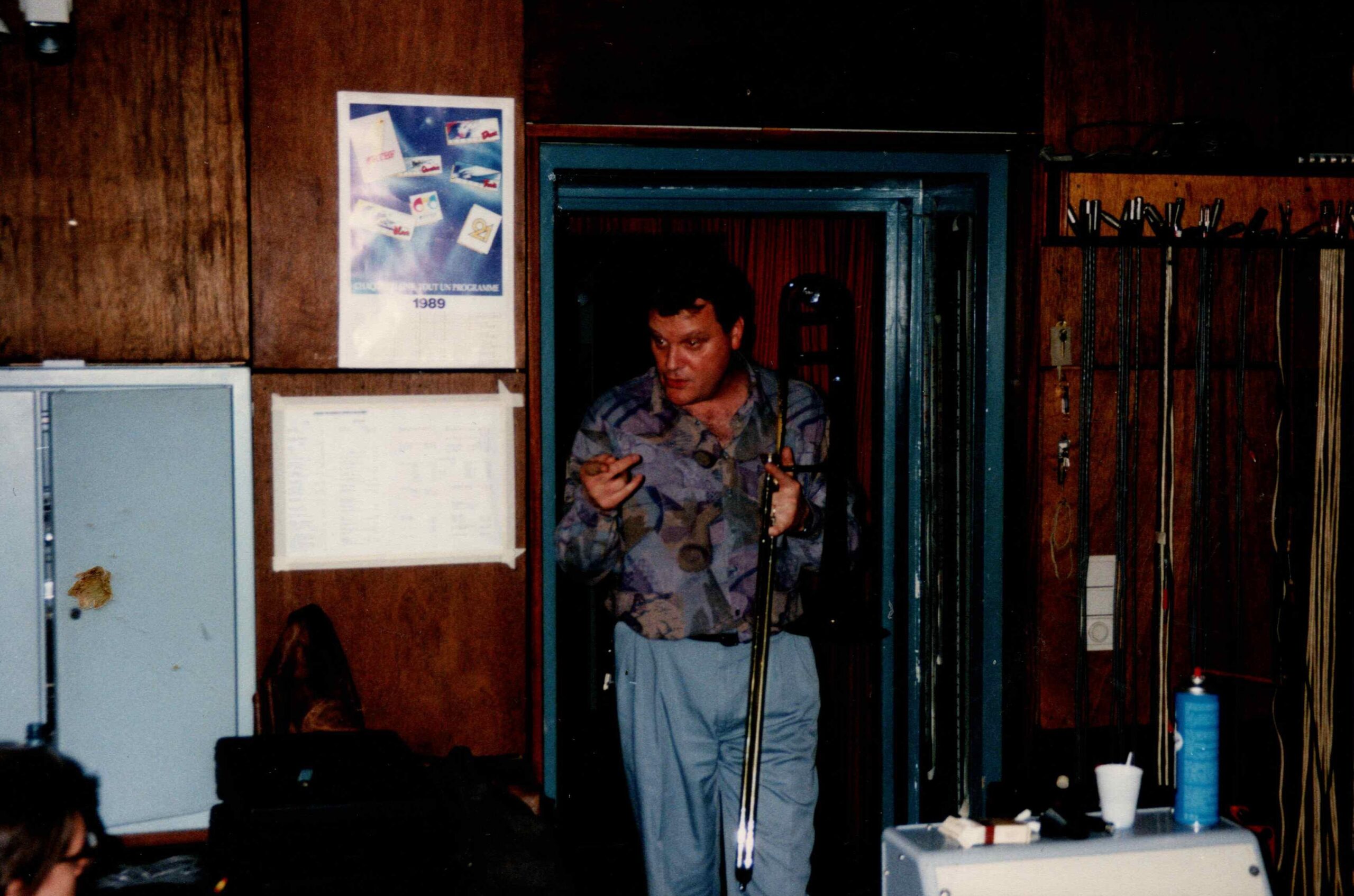
Frederic Rzewski brought him in his band, Music Electronic Viva (MEV). Henri Pousseur asked him to teach improvised music at the conservatory of Liège, which was open minded to new music in those days so he came to Belgium. It was good for Belgian musicians and for him too as he told us, that was a way to leave that hard and serious drug NY environment. He started meditation and Buddhism. He got married and had a family life.
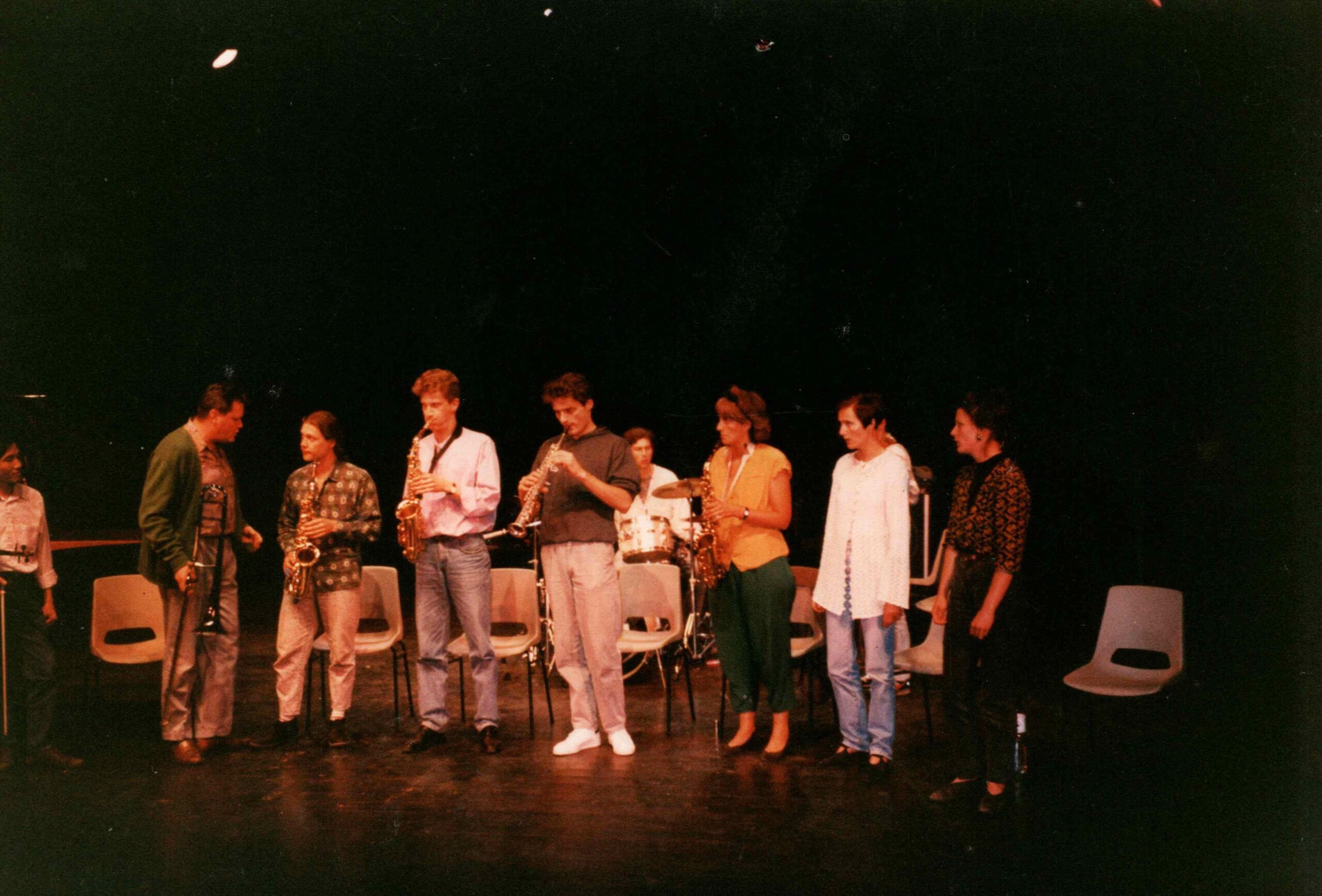
Now the very important thing is that he is a very charismatic and powerful personality who helped every kind of musicians, classical, jazz, rock, beginners, to bring out music and deepness as a part of notes and concepts. First thing is you can play whatever you want, but it has to be very deep and serious. Let’s better say first degree and to LISTEN!!! To be maximum attentive all the time and the moment whatever happens. He’s teaching that music works also with big dynamics, intention, energy and so on. All is music, the universe is music and sound. He takes all your concepts away and confronts you with moments difficult to explain. There were highly educated classical people playing and studying music for more than 15 years, but not able to bring out music without paper and notes. Another disaster of our society as I told before. I learned a lot and I’m very thankful. He was a big amazing, lovely and strong deep personality who gave all of his life to people to bring out deep music and sounds and to lose fixed concepts, but on another way it was cruel there were a lot of very educated classical musicians in the course which was very good, but we nearly played rhythmic music. We played in trio sections. All kinds of musicians, voice/violin/drums et cetera with all people free, loud, very loud, soft, very very soft cacophony free concerts with high level musicians. I still wanted to play jazz, combined with improvisation like Coltrane, Tyner, Garrison and Jones on ‘Afro Blue,’ that modal free period, Dave Holland ‘Conference of the birds,’ Wayne Shorter, Bill Frisell, not only free stuff.
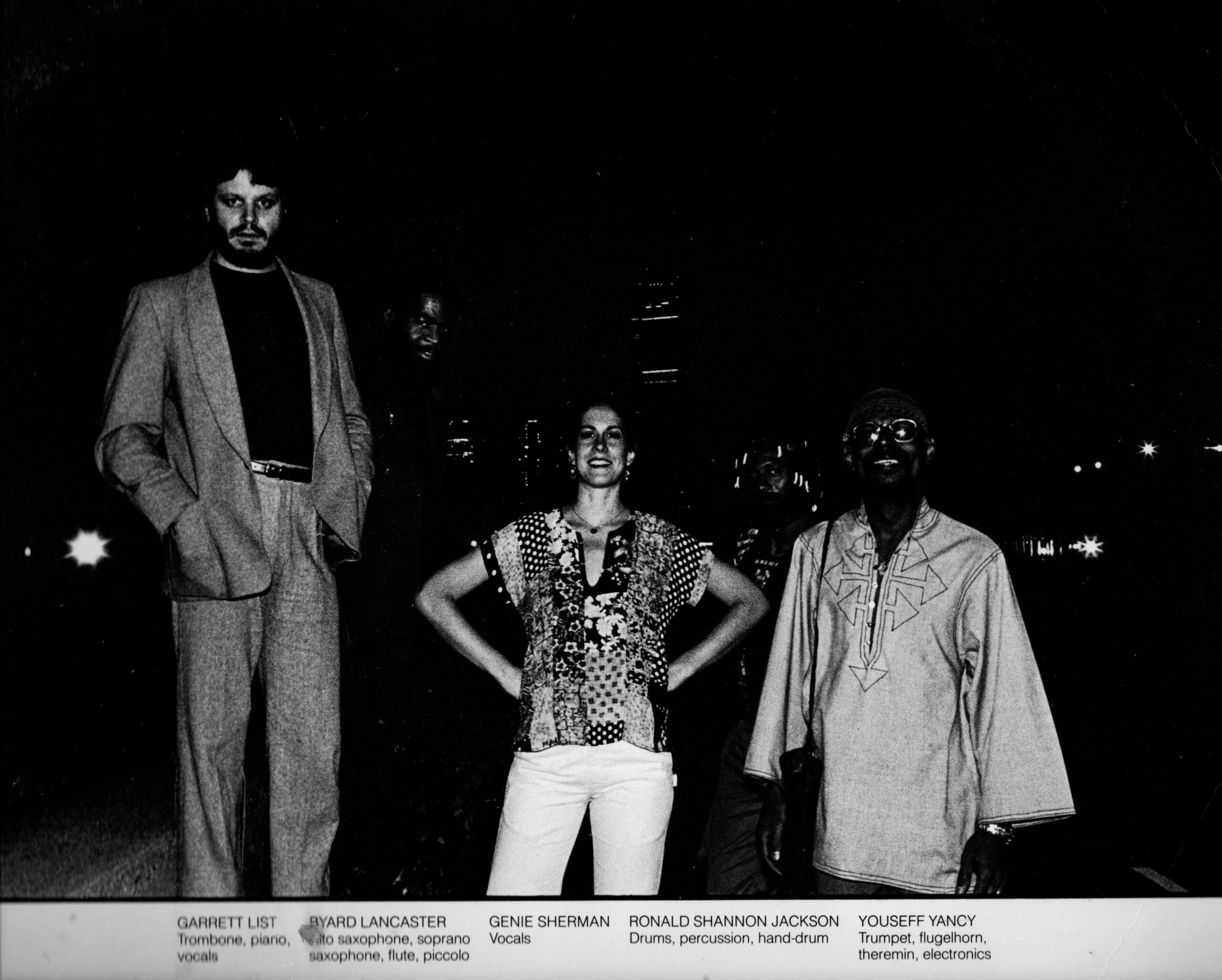
“No border between music and instruments”
Finally after these three years, getting older, 25 and earning money with painting houses and so on, I met the Belgian drummer Dre Pallemaerts in Antwerp. He is a very kind person and with a lot of luck I was accepted at the Lemmensinstituut in Leuven, in the Flemish part of Belgium (people were very kind to me there). Dre Pallemaerts was a teacher there. He is a very talented musical guy and he was teaching me drumming in that original organic way, you know, swing is not that triolet tinge ding. It comes from the natural bounce. First thing he taught me, “Let fall down the stick and the arm” (not to hit) and to feel the natural bounce like to let fall down a tennis ball, every human being has his own physics and bounce et cetera. Every human being forms his own sound and expression so by chance in my life we are again dealing with nature and cosmos. The master of this is Elvin Jones. Elvin is getting part of the instrument and the music, everything is turning around his movements, energy, sound et cetera. It’s like Jimi Hendrix. They are part of the instrument and the music. No border between music and instruments. They are even connected to the cosmos in that moment and just act like a kind of receptor of the cosmos and they just bring out this music. One part: musician, instrument, music, they are the instrument themselves. Dré was practicing Buddhism too and he was convinced that every human being can make music like God, if he is connected. I learned so much about music from him. We had to learn a little bit of piano and bass playing there. On the other hand I wasn’t this big talented drummer and his lessons didn’t follow this standard concept which was good in a way, but a lot of young drummers at the institute learned quicker and got better than me. Also I had big horror fights with solfege too. Ok, after some years I still finished there.
So after starting with rock and punk music in my life, I learned a kind of free music expression and after this traditional organic swing music. I’m crazy. In the following years I was more and more attracted to Soft Machine, Colosseum, King Crimson, Man, Cream, and all this stuff and I realized that the drummers of the music I was listening to, also had this “swing” background. Not that they maybe could be amazingly good jazz drummers, the sound was too heavy but there’s a lot of organic groove and feeling in that music. Ginger Baker, Mitch Mitchell are very good examples even Ian Paice was swinging in a way in the early years. I found an article where Roger Glover, Jon Lord and Blackmore had been fascinated that the little swinging drum feeling fits together with the more binary guitar rhythm playing kind of miracle. That’s what I do like in music. The drums had a more open sound which is necessary if you are playing like that, you have to bring the toms, BD, SD, cymbals all together in one sound like Mitch Mitchell, if not it sounds like shit. In more modern rock music that feeling gets lost. Every tom and drum is powered up and has a really binary feel, it’s maybe interesting too, but for me I’m missing that energy.
What was the original idea behind Violette Sounds and to what extent are you satisfied with the direction you’re currently driving with the band?
At the age of 40, after trying to form a lot of bands and to build up cover bands to earn money et cetera, I changed direction. I finally wanted to bring out my own ideas. There was a chaotic mix of music influences inside of me, different bands and songs. I had 14 different ideas and nearly each day I sat down after work and felt inside in which mood I was. This way helped me so I could continue and compose continually with no stress. One day a little bit of this song, a new mood for another et cetera. Step by step a simple base was growing. With Uwe Böttcher I found a very talented and creative bass and violin player and during a few days he made the music so nice. In three days more music happened in my life than years before. He took my basic ideas, he understood the meaning and created amazing music. A lot of other musician friends were playing on that project and were helping me to bring out my simple ideas. So that’s it, different moods and styles and various songs with a psychedelic crazy note and I was very happy with it. A big thank you to Ramon Creutzer of Umbu Records who helped me a lot with recording, mixing and arranging.
Would you like to elaborate how you got other members to participate? Tell us about their background.
Uwe is a very good and passionate bass and violin player living in Aachen. Gero Körner is a very nice Hammond and piano player from Aachen too, now living in Cologne. He’s crazy for Krautrock too. Both of them played with Rufus Zuphall, a German original Krautrock band from the 70’s in Aachen. Matthias Vogel is a passionate guitar player living near Paris, I met him at a concert in Berlin with his band and asked him to play guitar on ‘Moon’ and ‘Sun and Rain’. He did agree and recorded the guitar in his little home studio in France. ‘Little Buddha’ was a song of my own band I played with before. Walter Kraushaar is a crazy guitar player and well known German luthier who helped me with two songs. For the rest I found some musician friends of bands to play on the songs. My girlfriend is performing on ‘Tscha!,’ a crazy tune. I played a little bit of Rhodes and piano on some tunes, easy singing and some easy guitar sounds.
Tell us about your ‘Feelin Inside’ release?
I published it on my own and was happy to get some good and crazy reviews. A long way with no idea how the music business and music press does work. I sent CD’s to magazines and gave a lot of CD’s away to people around me. Luckily there are very nice music interested people for idealistic magazines in this world, who are listening and writing about that music, passionate people.
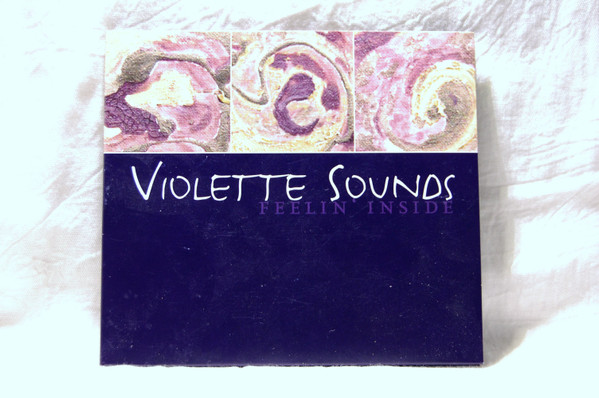
What about your latest, 2018 ‘Wild and Blue’? What’s the story behind it?
After ‘Feeling Inside’ we played some concerts and Violette Sounds got constant band members with Moritz Schippers (keys), Sascha Mans (bass), Henri Thönnissen (guitar). At that time, Moritz was a talented Hammond player in our region. Sascha, a very good and likeable bass player and easy to play with (he’s always playing what the music needs). And Henri, a creative melodic rock guitar player influenced by Ritchie Blackmore. I wanted to play more rock too and tried again to combine different moods. We created new songs. Moritz composed completely on his own ‘Saruman,’ (original title is ‘Cerumen,’ I changed the name to the more romantic name for the context of the album). To me this song is the most appreciated when we are playing live. He also made this rock arrangement of ‘Tod und Mädchen’ by Schubert. Axel Theorell helped us in the end with some vocals and brought the ‘Beggars’ song. We made a revival version of my favourite songs ‘Moon and ‘Firefog,’ an older part of another band with Henri. We played this guitar excursion and some other tunes. In a pensive mood I composed ‘Open White’. We have more than one life and some more songs. I wanted to get a step further with the band and the new album and Marcus Wicker of Eclipsed Magazine kindly helped us to find the German label MIG music.
Together with MIG we found this concept “Wild and Blue,” meaning that we play rock oriented on A-Side and somehow softer on the B-Side. The record is available on vinyl. The critics were mostly very positive, still not easy to describe our music and playing. We also did for 2 years this “undercover” mission on the Burg Herzberg Festival. We played there beside the stages in some little cafes and in the area to present our stuff.
How did Guru Guru collaboration come about?
MIG is a very good label for psychedelic and Krautrock music, but they have no booking agency so it wasn’t easy for new bands to get concerts. I realized that we really need these open minded psychedelic/Krautrock listeners to play our music therefore instead of finding clubs again to play I got in contact with Karl-Heinz Osche, a very nice and lovely person and the booking agent of Guru Guru. With his collaboration and mediating a few concerts for Guru Guru we got the occasion to play as support act for about 12 concerts with Guru Guru. Unfortunately, as the first gigs of the tour were supposed to start in Aachen and Amsterdam, Corona appeared and that was it. Finally we played later on a few concerts as a support act and we got nice feedback from an interested public.
What currently occupies your life? Can we expect something new?
As Corona was happening some text ideas were suddenly coming to my “mind.” I found some older non vocal song ideas of older rehearsals in our archive and new songs were born. We started to work on new stuff. The theme and title of the album will be ‘Infinity’. This time around the songs and lyrics are really about that we all are eternal. That there is another kind of reality beside our “normal state of life” and that one day we will find our real nature with a peaceful and fulfilled state of life. Yes, I believe in that. For two new songs, ‘Who Are You’ and ‘Infinity,’ I was searching for a good singer who also has a spiritual meaning and also kind of rock music background. In a way, the music has a little spiritual message, but we are not a smooth, esoteric band. It’s not easy to find a singer with balls. I was searching and Karl Heinz Osche helped me to get in contact with Arthur Brown. He has been in that spiritual way for years and is still making psychedelic rock music. He liked the songs but couldn’t manage to sing for us. I put the project aside. After a few months, by chance, I met Loten Namling, the Tibetan singer known as “Tibetan Warrior,” at a private birthday party. I had not heard about him before. He only performed one song, ‘Milarepa,’ on stage but I was so deeply moved by his voice, energy and music. ‘Milarepa’ is considered as one of the biggest Tibetan Yogis and Assets who got enlightenment after a tragic life history before.
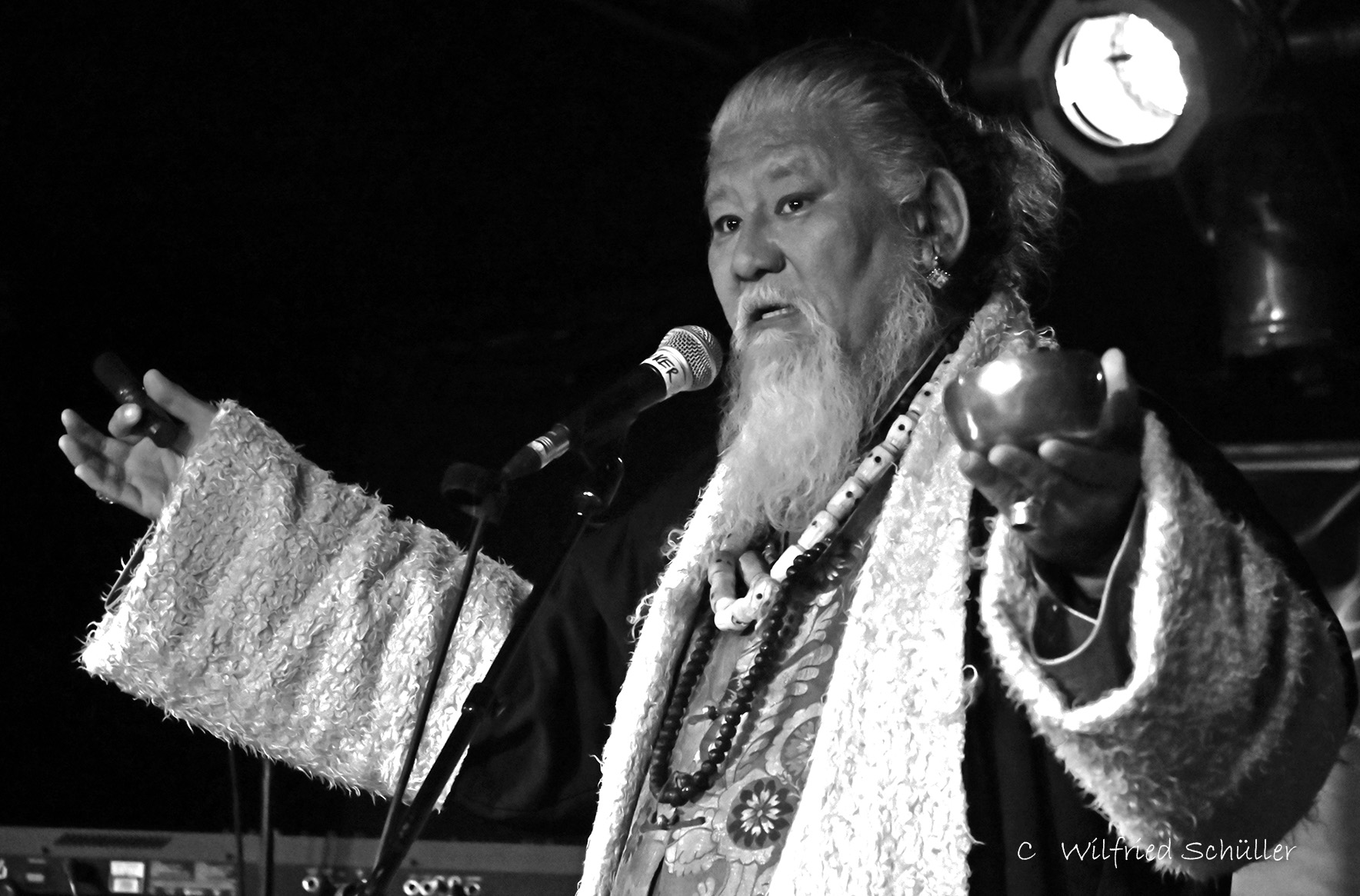
He is also very known for his lyrics and singing joyful and sacred Tibetan songs. Loten Namling is descendant of a famous Tibetan and Buddhist family. He grew up in exile in India and is living for more than 20 years in Switzerland. He is a professional traditional Tibetan singer and is fighting like a wolf for the freedom of his country. I got in contact with Loten and he did agree to try. It was a challenge too to perform for the first time in English. We met each other and with the help of Siro of Nota Falsa studios we arranged and recorded much more than two previewed songs. During recording Loten got an incredible energy and a lot of musical creativity for our music and took the occasion to create together with Henri a rock song for freedom. It’s called ‘Panchen Lama’ (Penchen Lama is the origin follower of the Dalai Lama, but he was kidnapped for more than 20 years by the Chinese government and nobody knows if he is still alive). Also he recorded together with Moritz the ‘Milarepa’ song on Hammond and created with Henri his ‘Birthday Song’. We will finish our album ‘Infinity’ soon and it will appear in springtime 2024 at Lucky Bob Records with our CD release tour.
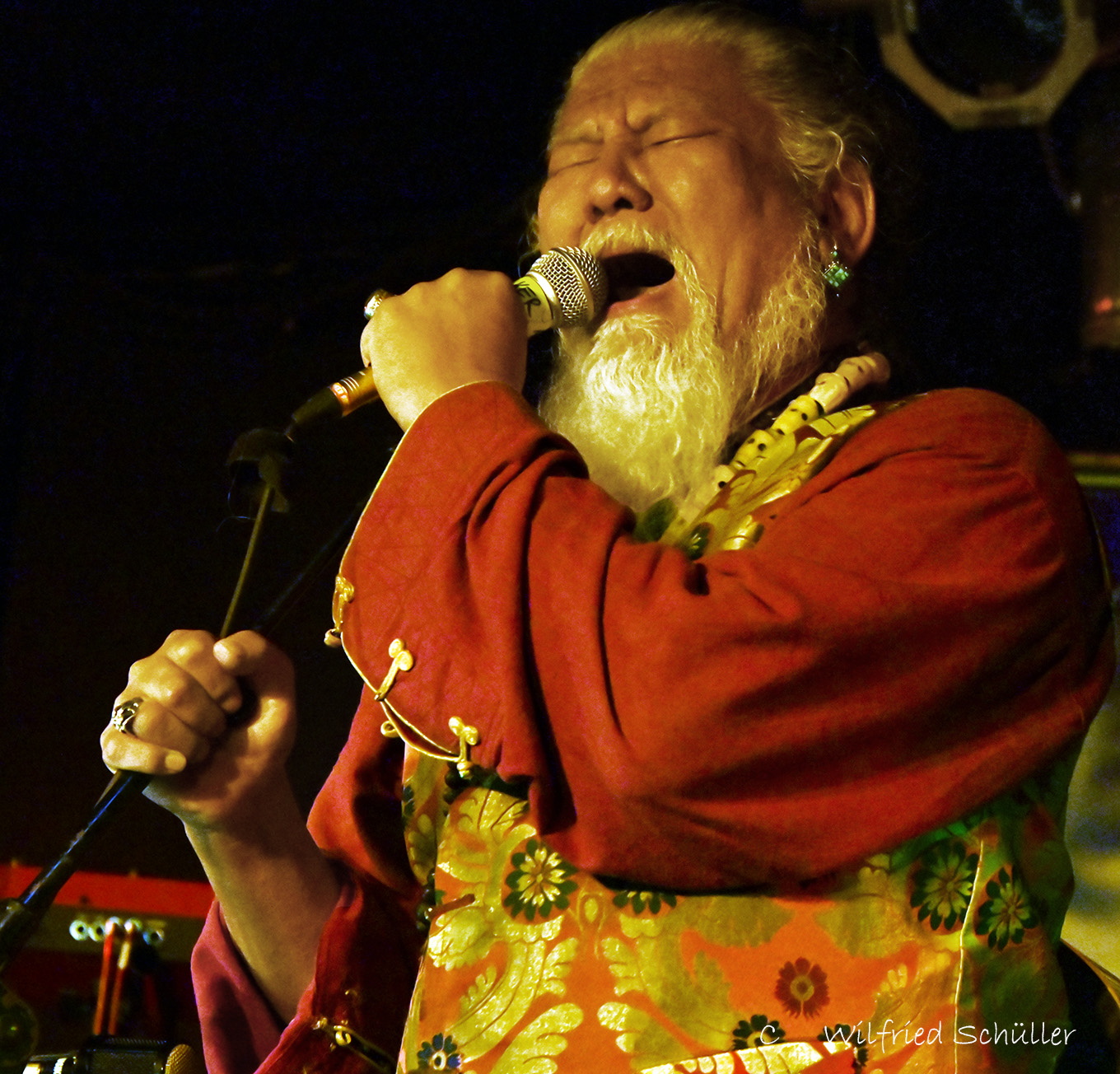
How do you usually approach music making? Is improvisation the core factor when it comes to creativity within your band?
Mostly I give a basic idea of chords, melody or atmosphere and the band will work it out. Basically there is a lot of space for soloing and improvisation. Also more complex songs are composed by Moritz, Henri and Uwe.
Let’s talk about your gear, pedals, effects and electronics.
Since 1994 I’ve been playing a Pearl session series kit 12”, 14” 18” BD, 21” inch Bosphorus Ride and 13” Bosphorus Hi Hat which I found in Istanbul and a UFIP special series 16” Chinese and Natural series splash and a Zildjian 18” Jazzride. For a few years I added a Meinl Byzance 14” crash. For a while I used to play an easy Ludwig accent series set 12”,14”,20”. I really liked the sound of the thin drums, but it seems that the quality is not that high. The drums are not round anymore. Henri is mostly playing a little Vox amp and a Fender Stratocaster. He uses traditional effect pedals Moritz uses to play live the NordStage and the Crumar Mojo on ‘Feeling Inside’ Gero was recording with an original Hammond and Leslie equipment. Uwe does use for recordings Sign Guitars Precision Jazz Bass with a Thomastik Jazz Flatwounds guitar neck. Live he’s using a Maruszczyk Elwood 4p Jazzbass with Rotosound 45 strings and an Hevos 300T bass amp.
Let’s end this interview with some of your favorite albums. Have you found something new lately you would like to recommend to our readers?
‘In the Court of the Crimson King’ by King Crimson
‘Hot Rats’ by Frank Zappa
‘The Real McCoy’ by McCoy Tyner
‘Old And New Dreams’ by Don Cherry, Dewey Redman, Charlie Haden, Eddie Blackwell
‘Low’ by David Bowie
Led Zeppelin Live at Madison Square Garden 1973
‘Avenue B’ by Iggy Pop
‘Raw Power’ by The Stooges
‘Seven’ by Soft Machine
‘Cottonwood Hill’ by Brainticket
‘Conference of the Birds’ by Dave Holland
‘Liberation Music Orchestra’ by Charlie Haden
‘Blind Faith’ by Blind Faith
‘Hamburger Concerto’ by Focus
‘Valentyne Suite’ by Colosseum
‘Pampered Menial’ by Pavlov’s Dog
‘Live at Birdland’ and ‘Afro Blue Impressions’ by John Coltrane
‘Electric Silence’ by Dzyan
‘Frumpy 2’ by Frumpy
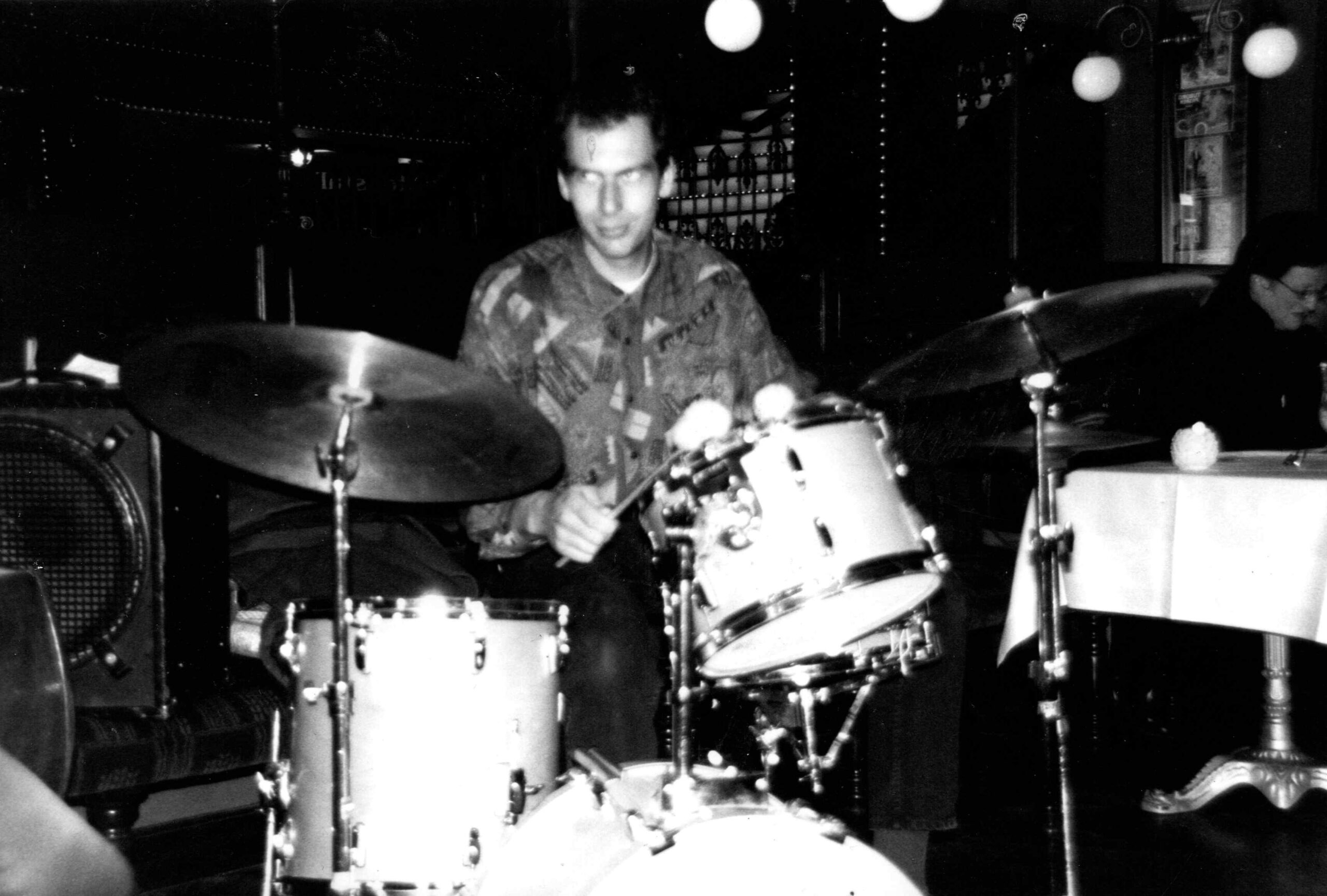
Thank you. Last word is yours.
Dear Klemen, thank you for the intense interview and may we all find our inner peace.
Klemen Breznikar
Headline photo: Live at Soest 2021
Violette Sounds Official Website / Facebook / YouTube

